Showing 11-20 of 69 results
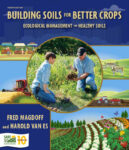
Building Soils for Better Crops
The fourth edition of Building Soils for Better Crops—enhanced and expanded—explains how to use ecological principles to build soil health and boost fertility, yields and overall sustainability.
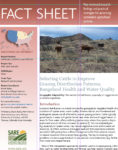
Selecting Cattle to Improve Grazing Distribution Patterns, Rangeland Health and Water Quality
This project is the first and only study that we are aware of that has evaluated whether grazing distribution has the potential to be improved through intensive breed selection. Most of the management approaches currently used to increase grazing uniformity, such as water developments and fencing, can resolve livestock grazing distribution problems on both private and public lands. However, these practices usually require large capital expenditures.
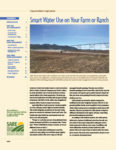
Smart Water Use on Your Farm or Ranch
As producers throughout the nation grow increasingly concerned about water scarcity, farmers, ranchers and agricultural educators are beginning to explore new, conservation-oriented approaches to water use.

What is Soil Health?
Soil health plays an essential role in raising healthy, productive crops and livestock. With this interactive infographic, learn how practices such as cover crops, no-till, crop rotation and the integration of livestock work in concert to improve soil health.
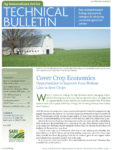
Cover Crop Economics
Cover crops can build soil health, control weeds, conserve moisture, provide grazing opportunities and more. But when do they start to pay for themselves? This analysis looks at the economics behind different management scenarios to determine if cover crops are likely to improve profitability in one, three or five years of use in corn and soybean rotations.
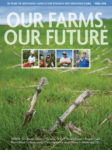
30 Years of SARE: Our Farms, Our Future
30 Years of SARE: Our Farms, Our Future tells the story of thousands of men and women who have led SARE and received SARE grants. They have one objective in common: making American agriculture stronger, more sustainable and better equipped to face the challenges of today and tomorrow.
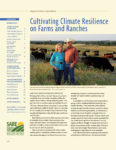
Cultivating Climate Resilience on Farms and Ranches
This bulletin outlines the new challenges that changing weather patterns pose in agriculture throughout the United States, and what you can do to make your farm more resilient.

Bringing Independent Farmers into the Marketplace
Small- and mid-sized farms are increasingly turning to supermarkets as a means to earn more for their products and to participate in local economies. In this video, Diana Endicott discusses how she decided to take this route 15 years ago when it was less typical, and how her efforts have resulted in a 100-member co-op today that sells to 30 stores in the Kansas City area.

The Power of Data: Improving the Management of Rangeland Ecosystems
California's rangelands face a wide range of challenges, from invasive species and pests to flooding and drought. Much of the knowledge of how to manage rangelands effectively resides in the personal experience of land managers. To capitalize on this collective wisdom, University of California Davis researchers partnered with ranchers around the region to compile a database of site-specific management information that can help everybody take better care of the land.

Investing in the Future of Agriculture: How SARE Supports Farmer-Driven Sustainability
The most pressing challenges that face U.S. agriculture today require science-based solutions developed by partnerships of farmers, ranchers, researchers and educators. Discover how the SARE program enables such partnerships to flourish and meet the needs of agricultural communities across the country.